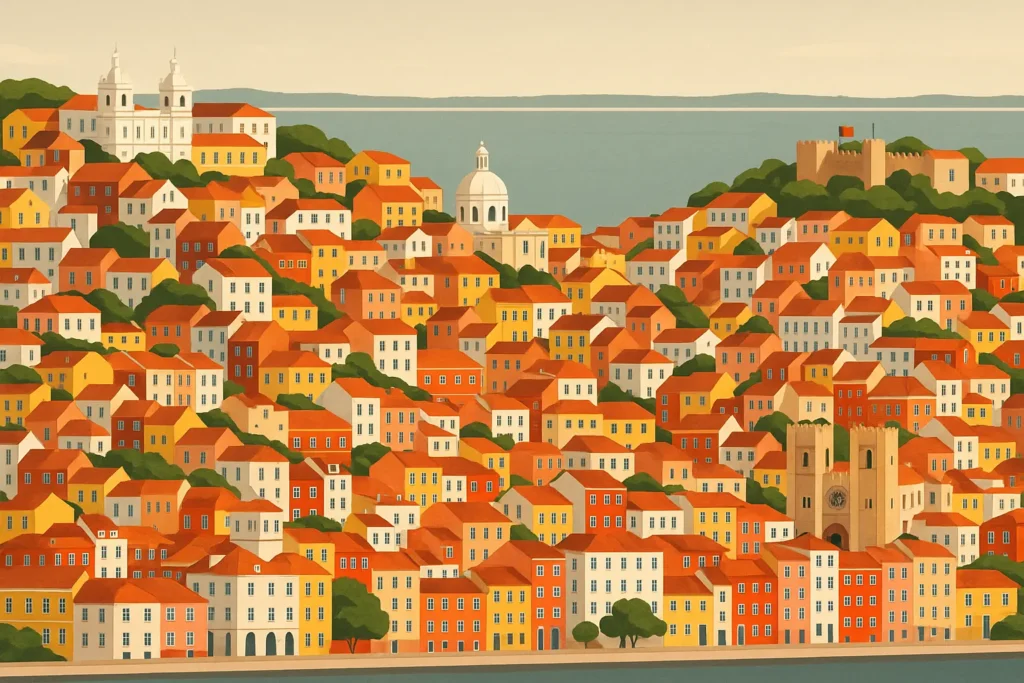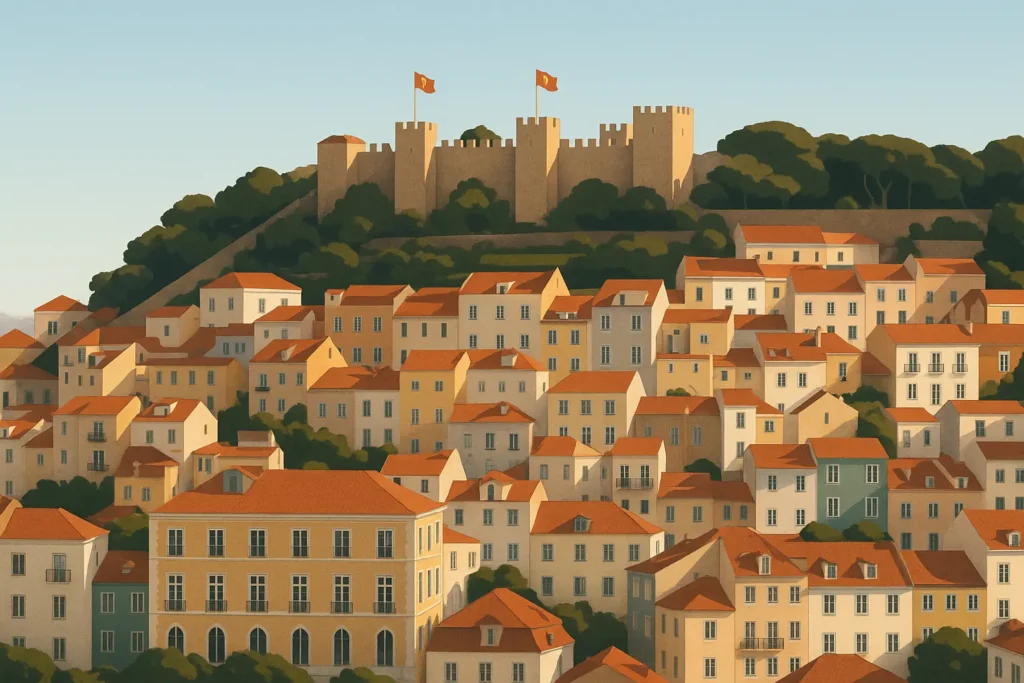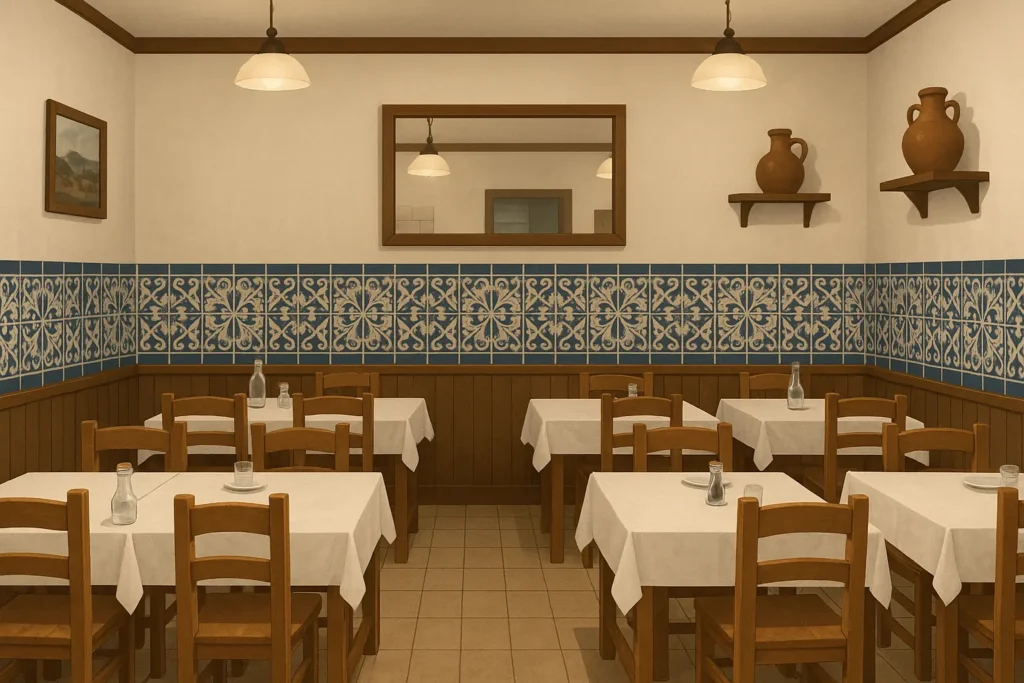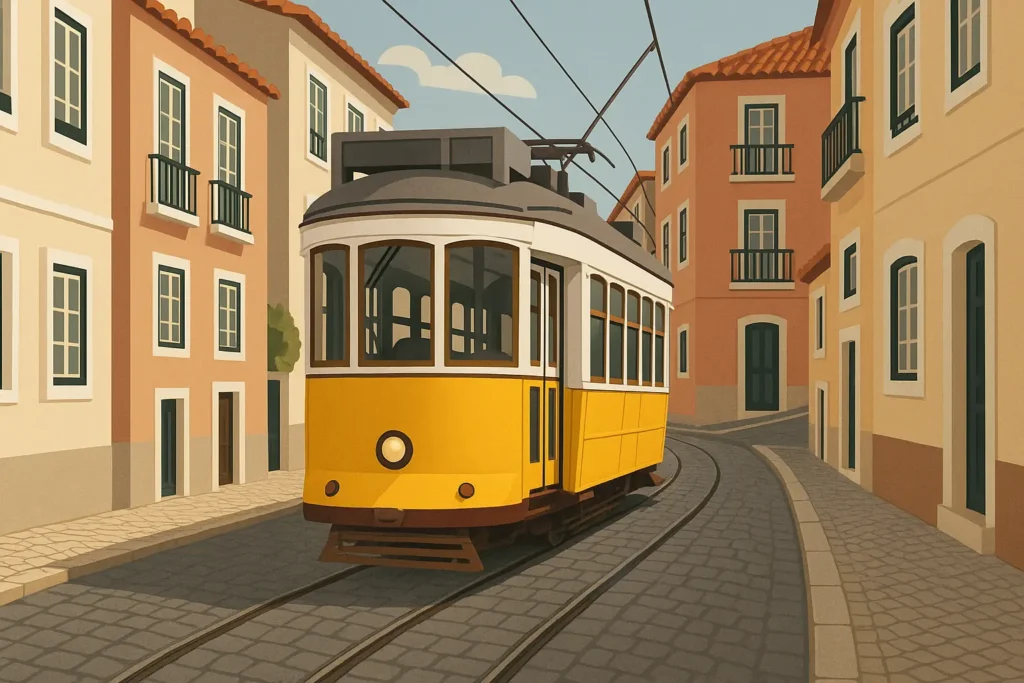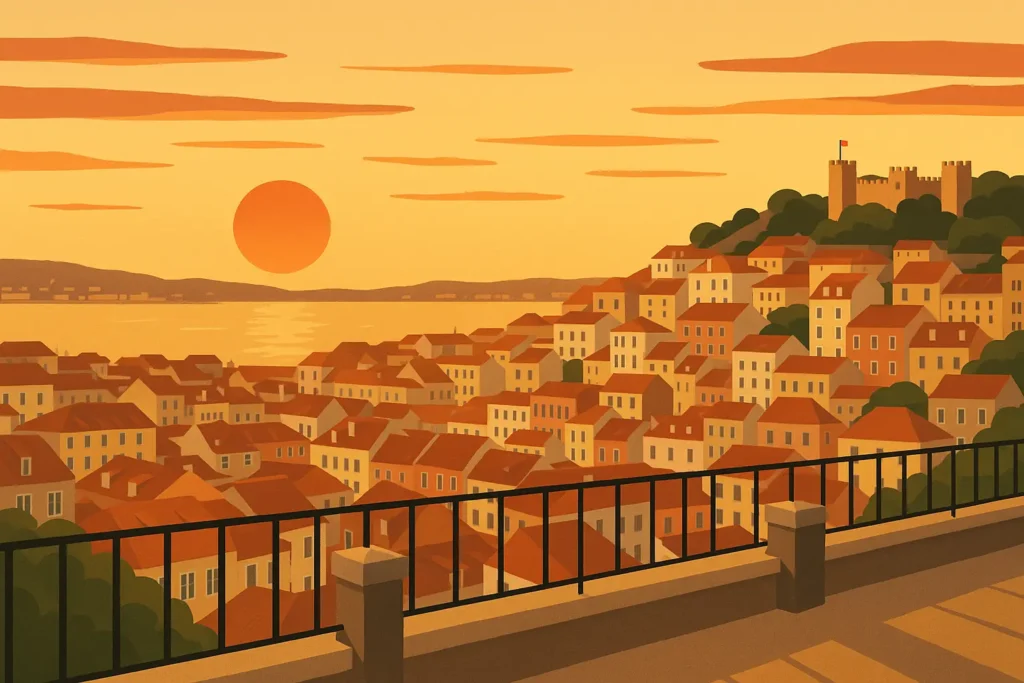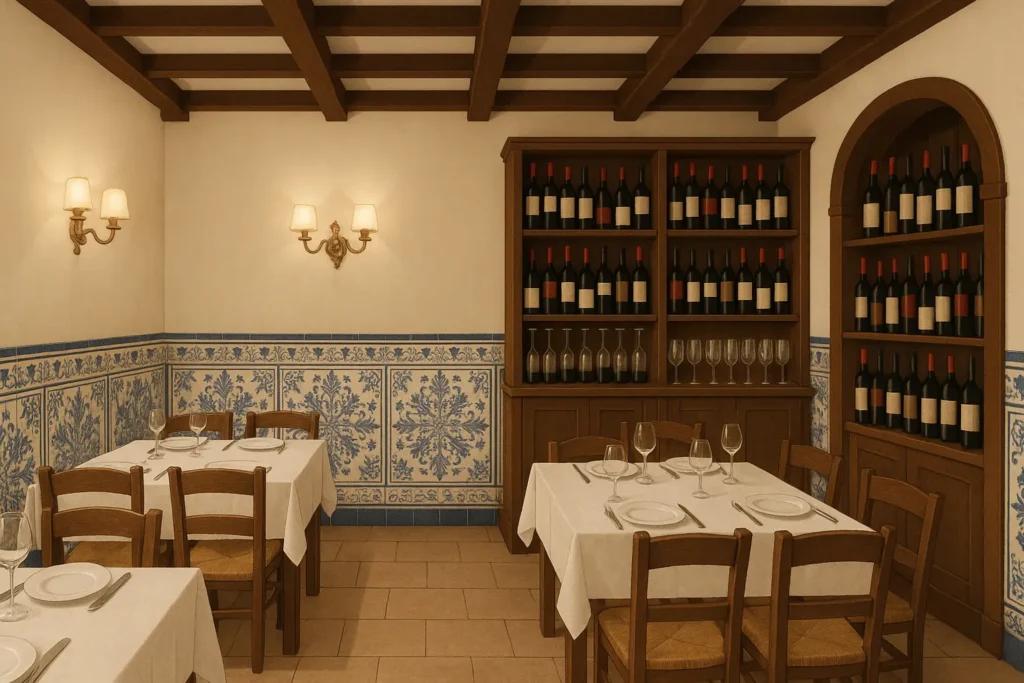Look, I learned the hard way that cramming Lisbon into just two days leaves you breathless and frustrated. I totally underestimated those hills on my first trip and wore the worst possible shoes – big mistake. After missing some incredible experiences during my rushed first visit, I discovered what most seasoned travelers already know: three days in Lisbon really is the sweet spot. You get to see the main stuff without feeling like you’re in some kind of travel boot camp.
Avoid travel FOMO—plan smarter and stress less with our Vacation Planner.
I’ve been to Lisbon a bunch of times now, and this timeframe gives you the perfect mix to experience the city’s highlights without your feet wanting to file a formal complaint. Whether you’re planning a quick weekend getaway or an extended Portuguese adventure, having the right game plan makes all the difference between a good trip and one you’ll still be talking about years later.
Quick Resources:
• Build your perfect Portugal itinerary with our Vacation Planner
• Planning a Lisbon celebration or girls’ getaway? Try the Bachelorette Party Planner
• Manage your travel costs effortlessly with the free Bachelorette Budget Calculator
• Explore all our Wedding & Travel Tools for seamless trip and event planning
I’ve put together 25 different ways to tackle Lisbon across six different approaches, so you’ll definitely find something that matches your travel style, budget, and how much your knees can handle. Trust me on this one – the right planning changes everything.
TL;DR
- Three days is honestly the sweet spot for hitting Lisbon’s highlights plus that essential Sintra day trip
- You can totally do this place on the cheap – 30-40 euros daily if you’re smart about it, while luxury experiences start around 200+ euros per day
- Those seven hills are no joke – plan accordingly or your feet will never forgive you
- Stay in Alfama for authentic vibes, Bairro Alto for nightlife, or Chiado if you want to be in the middle of everything
- The 72-hour transport pass (21 euros) is actually a steal and you’ll feel like a local
- Spring and fall are perfect – way fewer crowds than summer and the weather’s still great
- Book the good restaurants and popular stuff in advance because Lisbon’s blown up lately
- Tram 28, pastéis de nata, and fado shows are touristy for a reason – they’re actually amazing
- Day trips to Sintra, Cascais, and Porto will seriously level up your trip
- Food tours and cooking classes beat regular sightseeing every time
Key Planning Considerations for Your Lisbon Adventure
Before diving into specific itineraries, you need to get real about what you’re actually looking for. I’ve seen too many travelers show up in Lisbon without thinking about how this city’s unique personality will affect their trip. Here’s what nobody tells you – duration seriously affects what you can realistically pull off. Sure, you can hit the highlights in one day if you’re basically doing travel parkour, but three days lets you actually breathe and enjoy that must-do Sintra day trip everyone raves about.
Match your travel style to your ideal itinerary using our Vacation Planner—it helps you customize trips that actually fit you.
Real talk about money in Lisbon: You can absolutely do this place on 30-50 euros a day by eating those incredible bifana sandwiches and hanging out in neighborhood bars with locals. But if you want to splurge a little, maybe 80-120 euros a day gets you a nice hotel room and some really good meals without your credit card having a panic attack. Can you handle all the walking? Because Lisbon sits on seven hills and they’re not messing around – this is serious cardio disguised as sightseeing.
Budget like a pro—use our free Bachelorette Budget Calculator to plan your Lisbon expenses with zero guesswork.
Duration and Timing Strategy
Your trip length basically determines whether you’ll have an amazing time or feel like you’re in some kind of European travel boot camp. Most people figure out that three days hits the sweet spot – enough time to actually experience the city plus those essential day trips without feeling like you need a vacation from your vacation.
Spring (March-May) and fall (September-November) are money. You get perfect weather and way fewer crowds than the summer tourist invasion. Here’s where it gets interesting – summer brings those gorgeous long days perfect for evening activities, but also heat that’ll melt your enthusiasm and crowds that make popular attractions feel like a human sardine can.
Winter’s actually pretty great if you don’t mind the occasional rain. Hotel prices drop by 50% and you can have actual conversations with locals instead of fighting through tourist hordes. I actually prefer visiting during these quieter months when you can discover the real Lisbon.
Budget Framework Development
Lisbon works for pretty much any budget, which is honestly part of its charm. Budget travelers can absolutely thrive on 30-50 euros daily using hostels, public transport, and local tascas for authentic meals. I’ve met backpackers who’ve had incredible experiences eating bifana sandwiches and drinking wine at neighborhood bars for less than what others blow on a single fancy dinner.
If you want a bit more comfort, 80-120 euros daily gets you boutique hotels, nice restaurant meals, and guided tours that actually teach you stuff. Luxury experiences start around 200+ euros daily with five-star hotels, private guides, and Michelin dining that’ll make your Instagram followers seriously jealous.
Watch out for the sneaky costs though. Tourist tax adds 2 euros per person per night (maxed out at seven nights), and those skip-the-line tickets cost 5-10 euros extra but honestly save you 1-2 hours of standing around looking cranky. Trust me, during peak season those fast-pass tickets are worth their weight in pastéis de nata.
Lisbon Budget Planning by Travel Style
| Travel Style | Daily Budget | Accommodation | Meals | Transportation | Activities |
|---|---|---|---|---|---|
| Budget Backpacker | €30-40 | Hostel dorm (€18-25) | Tascas & markets (€15-20) | Public transport pass (€7) | Free walking tours (€5 tips) |
| Mid-Range Comfort | €80-120 | Boutique hotel (€60-80) | Mix of restaurants (€35-45) | Public + occasional taxi (€15) | Paid tours & museums (€25-35) |
| Luxury Experience | €200+ | 5-star hotel (€400+) | Michelin dining (€150+) | Private driver (€100) | Private guides & exclusive access (€300+) |
Can You Handle All the Walking?
Here’s what nobody tells you about Lisbon – those seven hills are absolutely no joke. Historic walking tours cover 8-12km daily on steep cobblestone streets with stairs that seem designed to test your life choices. Alfama exploration involves serious uphill climbs on uneven surfaces where elevators are basically mythical creatures.
I’ve definitely seen travelers in flip-flops struggling up these hills, sweating and questioning all their decisions. If that sounds like potential you, there are alternatives. Tram-based touring involves way less walking between stops, the flat Belém district is your friend, and modern areas actually have elevators and accessibility features.
Don’t let physical limitations stop you from experiencing Lisbon – just plan smarter. Private car tours, accessible attractions like the Oceanarium, and strategic hotel choices near metro stations can totally work. The city’s amazing regardless of how you get around.
Getting Around – Pick Your Adventure
Your transportation choices seriously affect both how much you spend and what kind of experience you have. Public transport is honestly great – tourist passes (24h for 6.40 euros, 72h for 21 euros) are a steal, and I always tell people to board Tram 28 at Martim Moniz or Campo Ourique instead of the tourist-packed central stops where you’ll be sardined in with everyone else’s selfie sticks.
Simplify your Lisbon logistics—plan routes, timing, and budgets easily with our Vacation Planner.
Private transport becomes worth it for groups of four or more, especially for day trips to Sintra, Óbidos, or Porto. Walking gives you the most authentic experience but requires decent fitness and comfortable shoes – seriously, I cannot stress the shoe thing enough. Cycling works great for waterfront areas, and electric bikes help with those hills if you don’t want to arrive everywhere looking like you just ran a marathon.
Duration-Based Itineraries (1-7 Days)
Let me break down how to tackle Lisbon based on how much time you’ve actually got. Each timeframe needs different strategies and expectations. Short stays mean sticking to the historic center to avoid spending half your time on trains, while longer visits let you actually relax and explore those amazing surrounding areas everyone talks about.
1. Perfect Day in Lisbon
Start your morning in historic Alfama – those narrow cobblestone streets and São Jorge Castle (10 euros entry, 2-3 hours) are absolutely worth getting up early for. The castle gives you incredible city views and teaches you about Lisbon’s medieval history without being boring about it. Pro tip: go early to beat the crowds and the heat.
Afternoon is perfect for the iconic Tram 28 experience – it connects all the major neighborhoods while giving you those scenic views everyone posts on Instagram. Hit up Rossio Square for people-watching and check out the elegant Chiado district for some shopping and café culture.
Evening has to end in Bairro Alto for dinner with traditional fado music. Expect to spend 45-60 euros per person for authentic fado dining that combines amazing Portuguese food with this UNESCO-recognized musical tradition that’ll give you chills.
2. Weekend in Lisbon (2 Days)
Day one focuses on the historic center – Alfama’s winding streets, Baixa’s grand squares, and Chiado’s cultural stuff. Start with São Jorge Castle in the morning, then work your way downhill through Alfama’s neighborhoods. Stop at those viewpoints (miradouros) for photos and to catch your breath.
Day two heads to Belém district for Portugal’s maritime history. Visit Jerónimos Monastery (10 euros) and Belém Tower, then absolutely must try those famous pastéis de nata at Pastéis de Belém bakery. The afternoon gives you time for LX Factory exploration or whatever else caught your eye.
My friend Sarah texted me after her weekend trip: “Dude, my feet are DESTROYED but holy crap this city is amazing. Why didn’t you warn me about the hills?! Day one’s castle-to-Alfama route was exhausting but magical – those cobblestone streets are no joke! Day two’s Belém focus was perfect because it’s flatter, and I was already tired from all the hill climbing. The pastéis de nata at the original bakery were worth the 20-minute wait. Seriously though, wear comfortable shoes and start early to beat the crowds.”
3. Classic Three Days in Lisbon
This three days in Lisbon approach gives you comprehensive city coverage plus those essential day trip experiences. Day one covers old town exploration including Alfama wandering, fado music introduction, and São Jorge Castle. Evening includes traditional dinner with live fado performance that’ll honestly blow you away.
Day two combines Belém monuments with a Sintra day trip – yeah, it’s packed but totally doable. Early morning train to Sintra lets you explore Pena Palace before heading back to Lisbon for Belém district afternoon activities. Fair warning: this is a big day that requires decent fitness and good time management.
Day three focuses on modern Lisbon experiences. Explore LX Factory for contemporary culture, visit Calouste Gulbenkian Museum for some serious art, and enjoy shopping in Príncipe Real neighborhood. End with sunset cocktails at rooftop bars overlooking the city – Instagram gold.
4. Extended Long Weekend (4 Days)
The fourth day adds flexibility for deeper neighborhood exploration or additional day trips. Consider a Porto day trip via high-speed train (2.5 hours each way) for northern Portugal cultural contrast. Alternatively, focus on Cascais coastal experience with beach time and seafood that’ll make you question why you ever eat seafood anywhere else.
This extended timeframe lets you actually relax and make spontaneous discoveries. You can revisit favorite neighborhoods, take cooking classes, or explore areas you missed during your initial three days in Lisbon without feeling rushed.
5. Week in Lisbon (7 Days)
Seven days lets you do multiple day trips and really dive deep into the city. Include Óbidos medieval town visit, Évora historical city exploration, and Comporta beach experiences. This timeframe supports both cultural immersion and actual relaxation – novel concept, right?
Extended stays let you develop local routines – morning coffee at neighborhood cafés, evening drinks at local wine bars, and deeper cultural understanding through repeated interactions with locals who’ll start recognizing you.
Budget-Focused Travel Plans
Let me break down how to experience Lisbon authentically across different spending levels. From backpacker-friendly 30-40 euros daily using hostels and local eateries to luxury experiences exceeding 200 euros daily with premium everything, each budget level offers totally different advantages. The key is smart money-saving strategies that help you maximize your Portuguese adventure regardless of how much you want to spend.
Whether you’re a backpacker or a baller, plan the perfect itinerary with our Vacation Planner.
6. Budget Backpacker Lisbon (€30-40/day)
Accommodation at Goodmorning Hostel costs 18-25 euros nightly in shared dorms with excellent central location and social atmosphere where you’ll actually meet cool people. Three-day public transport passes (21 euros) give you unlimited access to trams, buses, and metro throughout your stay.
Daily budget breakdown: 3 euros for morning coffee and pastry at local cafés, 5-10 euros tips for free walking tours (which are honestly amazing), 4 euros for bifana sandwiches at lunch, and 12 euros for dinners at traditional tascas. Evening entertainment focuses on Bairro Alto happy hours (6-8 PM) with 8-12 euro drink budgets.
Money-saving strategies include Sunday morning free museum visits, picnic supplies from local markets, and free viewpoints throughout the city. Many churches offer free entry, and neighborhood exploration costs nothing but gives you authentic cultural experiences. I’ve discovered some of my favorite Lisbon spots just wandering aimlessly through residential neighborhoods where tourists never go.
7. Mid-Range Comfort (€80-120/day)
Boutique hotels in central locations cost 60-80 euros nightly, giving you private bathrooms, breakfast options, and concierge services that actually help. Transportation combines public transport for daily activities with occasional taxis for convenience or those late-night returns when you don ‘t want to figure out the metro.
Restaurant meals range 25-35 euros for dinners at quality places serving traditional Portuguese cuisine with wine pairings that’ll educate your palate. Paid tours cost 15-25 euros per person and provide expert guidance plus skip-the-line access to popular attractions.
This budget level allows for selective splurges – maybe one Michelin-starred meal, private fado performance, or premium wine tasting experience while keeping overall costs reasonable.
8. Luxury Lisbon Experience (€200+/day)
Five-star accommodations like Four Seasons Hotel Ritz Lisbon (400+ euros nightly) provide exceptional service, prime locations, and luxury amenities including spas, concierge services, and premium dining that’ll spoil you forever.
Private guides cost 300 euros daily for couples, offering customized experiences, expert knowledge, and flexible scheduling that regular tours can’t match. Michelin-starred dining experiences range 150+ euros per person for tasting menus with wine pairings at restaurants like Alma or Feitoria that’ll redefine your understanding of Portuguese cuisine.
Exclusive experiences include private fado performances in historic palaces, helicopter tours over Lisbon and Sintra, private wine tastings with renowned sommeliers, and yacht charters on the Tagus River. Basically, if you can dream it, they can arrange it.
9. Family Budget-Friendly (€100-150/day for family of 4)
Family hotels with connecting rooms or suites cost 80-120 euros nightly, providing space and amenities for comfortable family stays without everyone wanting to kill each other. Kid-friendly restaurants offer children’s menus and relaxed atmospheres for family dining where nobody judges you if your kids are being kids.
Educational activities include the Oceanarium (16 euros adults, 11 euros kids), interactive science museums, and castle explorations that engage children while teaching them stuff. Public transport accommodates strollers and offers family-friendly exploration options that don’t require Olympic-level logistics.
Budget allocation: 50 euros daily for family meals, 30 euros for attractions and activities, and 20 euros for transportation and incidentals. Ice cream stops, playground visits, and beach time in Cascais provide child-focused entertainment within budget constraints.
Interest-Based Exploration Routes
Here’s where it gets interesting – specialized itineraries based on what actually gets you excited. Whether you’re obsessed with Portuguese food, fascinated by maritime history, drawn to contemporary art, excited by nightlife scenes, or seeking outdoor adventures, these focused approaches let you dive deep into what you’re passionate about instead of just checking boxes on a generic tourist list.
10. Foodie’s Lisbon Itinerary
Morning exploration starts at Mercado da Ribeira food hall, where local vendors offer traditional Portuguese ingredients, fresh seafood, and artisanal products that’ll make you want to completely redesign your home kitchen. Guided food tours (45 euros) provide cultural context while you sample regional specialties from multiple vendors – it’s like a delicious history lesson.
Afternoon cooking classes at Cooking Lisbon (65 euros) teach traditional Portuguese techniques using fresh local ingredients. You’ll learn to make bacalhau à brás, caldo verde, and pastéis de nata while understanding their historical and cultural significance – way better than just eating them.
Evening progressive dinners move through different neighborhoods, experiencing varied culinary styles. Must-try dishes include seafood cataplana (this amazing seafood stew that comes in a copper pot and smells so good you’ll want to dive face-first into it), grilled sardines, francesinha sandwiches, and regional wine pairings with vinho verde or Douro reds.
Food markets worth exploring include Mercado do Bolhão for traditional atmosphere and Mercado de Campo de Ourique for local neighborhood experiences where you’ll actually see Portuguese families doing their weekly shopping.
11. History & Culture Deep Dive
Detailed museum exploration includes National Museum of Ancient Art for Portuguese masterpieces, Calouste Gulbenkian Museum for international collections, and Maritime Museum for Portugal’s Age of Discovery artifacts that tell the story of how this small country basically ruled the seas.
Guided tours of major monuments provide historical context you’d totally miss during independent visits. Jerónimos Monastery tours explain Manueline architecture and Portugal’s maritime empire, while São Jorge Castle visits cover medieval Lisbon and Moorish influences that shaped the city.
Archaeological sites and lesser-known historical locations include Roman ruins beneath the city, medieval wall remnants, and 1755 earthquake reconstruction evidence throughout Baixa district’s urban planning. Cultural experiences include traditional fado performances in authentic venues, azulejo tile workshops, and Portuguese literature discussions at historic bookstores like Livraria Bertrand.
12. Art & Architecture Focus
Modern art exploration centers on Museu Coleção Berardo for contemporary international works and Museu Nacional de Arte Contemporânea for Portuguese modern artists. Gallery districts in Príncipe Real and LX Factory showcase emerging local talent that’ll give you serious art envy.
Azulejo tile appreciation includes the dedicated tile museum and tile hunting throughout the city’s buildings, metro stations, and public spaces. Photography workshops focus on capturing architectural details and urban art installations – your Instagram will never be the same.
Contemporary architecture in Parque das Nações demonstrates modern Portuguese design, while historic architecture tours cover Manueline, Gothic, and Pombaline styles throughout different city districts.
Street art tours reveal Lisbon’s vibrant urban art scene, particularly in neighborhoods like Mouraria and Marvila, where international and local artists create large-scale murals and installations that transform entire building sides into masterpieces.
13. Nightlife & Entertainment
Bairro Alto bar hopping begins with early evening aperitifs at traditional wine bars, progresses through craft cocktail establishments, and culminates in late-night dancing at local clubs and music venues where the party doesn’t stop until sunrise.
Traditional fado performances in Alfama provide authentic Portuguese musical experiences in intimate settings. Reserve tables at Sr. Fado or Clube de Fado for dinner combined with live performances by renowned fadistas – it’s emotional in the best possible way.
Rooftop bars offer spectacular city views during sunset hours. Silk Club, Park Bar, and Memmo Alfama provide different atmospheres and price points for elevated drinking experiences with panoramic vistas that’ll make you understand why people fall in love with this city.
LX Factory evening scene combines dinner, drinks, and cultural events in converted industrial spaces. Live music venues, art exhibitions, and late-night dining create dynamic entertainment options that feel authentically Lisbon.
14. Outdoor & Adventure Lisbon
Hiking opportunities in Sintra-Cascais Natural Park offer coastal trails, forest paths, and mountain viewpoints accessible via public transportation from central Lisbon. Trail difficulty ranges from easy coastal walks to challenging mountain climbs that’ll test your fitness level.
Surfing lessons in Cascais provide Atlantic Ocean experiences with professional instruction and equipment rental. Beach conditions vary seasonally, with autumn offering optimal waves and fewer crowds of beginners flailing around.
Cycling along the Tagus River utilizes dedicated bike paths connecting central Lisbon to Belém district. Electric bike rentals help navigate hilly terrain while providing eco-friendly transportation options that won’t leave you completely exhausted.
Sunset sailing trips on the Tagus River offer unique city perspectives and relaxing maritime experiences. Small group tours provide intimate settings with local captains sharing maritime history and navigation knowledge.
Transportation-Style Adventures
Your transportation choices totally change your Lisbon experience. Whether you enjoy walking for authentic street-level discoveries, prefer public transport for local cultural immersion, want private driver luxury for maximum comfort, or desire cycling adventures for eco-friendly exploration, each method creates different travel rhythms and reveals unique aspects of the city.
15. Walking-Focused Lisbon
Walking itineraries focus activities within manageable distances, connecting neighborhoods that flow naturally from one to another. Routes include strategic rest stops at cafés, viewpoints, and parks to prevent your feet from staging a revolt.
Comfortable footwear becomes absolutely essential for cobblestone streets, steep inclines, and extended walking periods. I cannot stress this enough – those cute shoes you packed? Save them for dinner. Recommended routes connect Alfama to Baixa via scenic staircases, Chiado to Bairro Alto through cultural districts, and Belém waterfront for flat terrain recovery.
Daily walking distances average 8-12km with elevation changes requiring decent physical condition. Plan morning starts to avoid afternoon heat, carry water bottles, and schedule midday breaks during peak sun hours when even the locals hide indoors.
16. Public Transport Explorer
Tram 28 full circuit provides comprehensive city overview while experiencing Lisbon’s most iconic transportation method. Board at less crowded stops like Martim Moniz or Campo Ourique to actually get a seat instead of being crushed against someone’s backpack for the entire ride.
Metro system efficiently connects modern districts, airport, and major attractions with clean, reliable service that puts many other European cities to shame. Bus networks fill gaps between tram and metro lines, reaching neighborhoods inaccessible by rail transport.
Elevador da Bica and other funiculars offer unique transportation experiences while conquering Lisbon’s steep hills without destroying your knees. Public transport passes provide unlimited access and serious cost savings compared to individual ticket purchases.
Lisbon Transportation Options Comparison
| Transport Method | Cost (3-day pass) | Best For | Coverage | Comfort Level |
|---|---|---|---|---|
| Public Transport Pass | €21 | Budget travelers, local experience | Citywide + suburbs | Moderate |
| Walking | Free | Cultural immersion, photography | Historic center only | High effort required |
| Private Driver | €600+ | Luxury, families, mobility issues | Unlimited including day trips | Maximum comfort |
| Bicycle/E-bike | €45-60 | Eco-friendly, waterfront areas | Limited to flat areas | Moderate |
| Taxis/Uber | €8-15 per trip | Convenience, late night | Citywide | High convenience |
17. Private Driver Luxury
Personal drivers eliminate navigation stress, parking nightmares, and physical fatigue while maximizing sightseeing time. Day rates around 200 euros include vehicle, fuel, and driver expertise for customized itinerary flexibility that regular tours can’t match.
Sintra, Cascais, and other day trips become effortless with private transportation, allowing multiple stops and personalized pacing. Drivers often provide local insights, restaurant recommendations, and cultural context during travels – basically a mobile concierge service.
Air conditioning, comfortable seating, and luggage storage enhance comfort levels, particularly valuable for families, elderly travelers, or those with mobility limitations who still want to see everything.
18. Cycling Lisbon
Waterfront cycling paths offer flat, scenic routes perfect for leisurely exploration between central Lisbon and Belém district. Dedicated bike lanes provide safe passage away from vehicle traffic and aggressive Portuguese drivers.
Electric bike rentals help navigate hilly neighborhoods that would otherwise challenge traditional cycling. Battery assistance makes areas like Alfama and Bairro Alto accessible for cyclists of varying fitness levels without requiring Tour de France conditioning.
Bike rental locations throughout the city provide convenient pickup and drop-off options. Many hotels offer bicycle storage and route planning assistance for cycling-focused stays.
Group-Specific Itineraries
Different traveler types need totally different approaches. Solo adventurers want safety, flexibility, and chances to meet people. Couples seek romantic experiences and intimate settings. Families need kid-friendly activities and practical logistics. Friend groups focus on shared experiences and social activities. Each group benefits from tailored approaches that match their specific goals.
19. Solo Traveler’s Lisbon
Safe neighborhoods for solo exploration include well-lit Baixa, busy Chiado, and tourist-friendly Belém areas. Avoid isolated Alfama streets after midnight and stick to main thoroughfares during evening activities – common sense stuff, really.
Social opportunities happen naturally through free walking tours, cooking classes, and wine tastings where solo travelers connect with others. Hostel common areas and food markets provide informal meeting spaces for fellow adventurers who are also figuring out this whole solo travel thing.
Flexible scheduling advantages allow spontaneous discoveries, last-minute restaurant reservations, and personal interest pursuits without group compromise. Solo travelers can linger at museums, extend café visits, or completely change plans based on weather or mood.
Single supplements at boutique hotels may add 30% to accommodation costs, making hostels or apartment rentals more economical for budget-conscious solo travelers.
20. Romantic Couples Getaway
Sunset viewpoints create magical romantic moments, particularly at Miradouro da Senhora do Monte and Miradouro de Santa Luzia. Time visits for golden hour photography and intimate conversation opportunities that’ll make your relationship Instagram official.
Wine tastings at intimate venues like By the Wine in Chiado provide cozy atmospheres for couples to sample Portuguese varietals while learning about regional wine production and food pairings – way more romantic than it sounds.
Romantic fado dinners combine traditional music with candlelit dining at venues like Sr. Fado or Clube de Fado. Reserve tables for two in quieter sections away from larger groups for more intimate experiences that’ll give you chills.
Couples spa treatments at luxury hotels offer relaxation and bonding experiences. Four Seasons Ritz Lisbon and other premium properties provide couples massage packages and private spa facilities.
21. Family with Kids Itinerary
Oceanarium visits captivate children with Europe’s largest aquarium featuring diverse marine life, interactive exhibits, and educational programs designed for young learners. Allow 2-3 hours for thorough exploration and inevitable gift shop negotiations.
Interactive museums like Pavilion of Knowledge provide hands-on science experiments and educational entertainment that engages children while teaching Portuguese culture and history through play-based learning instead of boring lectures.
Castle explorations at São Jorge offer adventure and imagination opportunities as children explore medieval fortifications, climb ancient walls, and learn about knights and battles through interactive displays that make history actually exciting.
Beach time in Cascais provides family-friendly coastal experiences with calm waters, playground facilities, and beachfront restaurants accommodating children’s needs and energy levels.
The Martinez family texted me after their trip: ” “Traveling with our 8 and 12-year-old to Lisbon required serious strategy. The Oceanarium was our biggest hit – the kids spent three hours there and didn’t want to leave! We learned to start early (9 AM) to beat crowds and heat, used the metro extensively (kids love trains), and always had backup indoor options for when little legs got tired. The castle was exciting for them, but we took the elevator up instead of walking those brutal hills. Pro tip: Portuguese people are incredibly welcoming to families, and most restaurants happily accommodate children without making you feel like terrible parents.”
22. Friends’ Group Adventure
Group dining experiences at restaurants like Time Out Market allow friends to sample multiple cuisines while sharing dishes and comparing favorites. Large tables accommodate groups and encourage social interaction without awkward seating arrangements.
Bar crawls through Bairro Alto create memorable shared experiences with diverse venue options, from traditional wine bars to modern cocktail establishments. Group discounts often apply for larger parties, making the damage to everyone’s liver more affordable.
Shared accommodations like large Airbnb apartments or connecting hotel rooms provide common spaces for group gathering while maintaining individual privacy when someone needs to escape the group dynamic.
Group activities like cooking classes, wine tastings, and guided tours often offer discounted rates for parties of 6+ people, making premium experiences more affordable when costs are shared among friends.
Seasonal and Special Occasion Plans
Seasonal itineraries help you optimize your Lisbon experience based on weather patterns, local events, and seasonal attractions. Spring festivals, summer beach combinations, and special occasion celebrations like bachelorette parties need different planning approaches and activity selections. Understanding seasonal advantages helps you choose the best time for your specific interests and travel goals.
23. Spring Festival Season (March-May)
Perfect weather conditions with temperatures ranging 15-22°C create ideal conditions for outdoor activities, walking tours, and al fresco dining. Minimal rainfall and comfortable temperatures support extended sightseeing without weather-related drama.
Outdoor festivals and cultural events happen constantly during spring months. Lisbon Marathon, outdoor concerts, and street festivals provide authentic local experiences and cultural immersion opportunities that summer tourists completely miss.
Flower blooms in parks and gardens create spectacular photography opportunities and romantic settings. Gulbenkian Garden, Príncipe Real Garden, and Sintra palace gardens showcase seasonal beauty at their absolute peak.
Tourist crowds remain 40% lower than summer levels while weather conditions rival peak season quality, creating optimal balance between comfort and authentic local experiences.
24. Summer Beach & City Combo
Morning city exploration takes advantage of cooler temperatures and fewer crowds at major attractions. Start early (8 AM) to complete walking tours and museum visits before afternoon heat turns you into a sweaty tourist stereotype.
Afternoon beach time in Cascais or Estoril provides coastal relief from city heat while maintaining easy public transport connections back to central Lisbon. Beach clubs offer dining and relaxation facilities where you can pretend you’re sophisticated.
Extended daylight hours (sunset at 8-9 PM) allow longer sightseeing days and evening activities. Rooftop bars and outdoor dining become particularly appealing during warm summer evenings when the whole city comes alive.
Outdoor dining proliferates with restaurant terraces, street-side tables, and food market outdoor seating creating vibrant social atmospheres throughout the city.
25. Bachelorette Party Lisbon
Group-friendly accommodations like penthouse Airbnb rentals in Príncipe Real provide common spaces for getting ready, pre-party gatherings, and post-activity debriefing while maintaining central location convenience for maximum party potential.
Wine tastings and cooking classes create memorable shared experiences that combine learning with celebration. Private group bookings ensure personalized attention and customized experiences for the bride-to-be that’ll make everyone’s Instagram stories fire.
Spa treatments at luxury hotels offer relaxation and pampering opportunities. Group packages often include champagne service, private facilities, and coordinated treatment timing for simultaneous experiences.
Vibrant nightlife in Bairro Alto provides diverse venue options from intimate wine bars for early evening to energetic dance clubs for late-night celebration. Professional photographers can capture special moments throughout the celebration without anyone having to be the designated photo person.
Planning a Lisbon bachelorette or destination celebration? Create a stress-free itinerary with our Bachelorette Party Planner.
Detailed Itinerary Examples with Real Costs
These comprehensive examples give you specific timing, costs, and logistics for three totally different travel styles. The classic three-day itinerary balances major attractions with cultural experiences, while the budget backpacker version shows how to experience Lisbon authentically on minimal funds. The luxury experience showcases premium options for travelers seeking exceptional service and exclusive access. Each example includes real pricing, practical tips, and detailed scheduling to help you plan effectively.
Classic Three Days in Lisbon (Detailed Breakdown)
Day 1: Historic Heart (Total: €85-100 per person)
- 9:00 AM: Rossio Square start, Elevador de Santa Justa views (€5)
- 10:30 AM: São Jorge Castle exploration (€10 entry, 2-3 hours)
- 1:00 PM: Lunch in Alfama at Chapitô À Mesa (€15-20 per person)
- 3:00 PM: Alfama wandering, Fado Museum visit (€5)
- 5:00 PM: Miradouro da Senhora do Monte sunset views (free)
- 8:00 PM: Traditional fado dinner at Sr. Fado (€45-60 per person)
Day 2: Belém & Sintra (Total: €65-80 per person)
- 8:00 AM: Early train to Sintra (€4 each way)
- 9:30 AM: Pena Palace and gardens (€14 entry)
- 1:00 PM: Lunch in Sintra village (€12-15)
- 3:00 PM: Return to Lisbon, head to Belém
- 4:30 PM: Jerónimos Monastery (€10 entry)
- 6:00 PM: Pastéis de nata at Pastéis de Belém (€3)
- 7:00 PM: Belém Tower exterior and waterfront walk (free)
Day 3: Modern & Local (Total: €55-70 per person)
- 10:00 AM: LX Factory exploration and coffee (€5)
- 12:00 PM: Lunch at Mercado da Ribeira (€15-20)
- 2:00 PM: Calouste Gulbenkian Museum (€10 entry)
- 4:00 PM: Chiado district shopping and exploration
- 6:00 PM: Rooftop drinks at Silk Club (€12-15)
- 8:00 PM: Dinner in Príncipe Real (€25-35)
Budget Backpacker Lisbon (Complete 3-Day Breakdown)
Accommodation: Goodmorning Hostel (€20/night average)
Transportation: 3-day public transport pass (€21 total)
Total Budget: €35-40 daily
Day 1 Expenses (€38 total):
- Breakfast: Local café coffee and pastry (€3)
- Morning: Free walking tour with tip (€8)
- Lunch: Bifana sandwich at As Bifanas do Afonso (€4)
- Afternoon: São Jorge Castle student discount (€5)
- Dinner: Traditional tasca meal (€12)
- Evening: Bairro Alto drinks during happy hour (€6)
Money-Saving Strategies:
- Sunday morning free museum entries
- Picnic lunches from Mercado da Ribeira
- Free viewpoints instead of paid attractions
- Happy hour timing (6-8 PM) for drinks
- Walking instead of paid transportation when possible
Daily Cost Breakdown by Budget Level (Per Person)
| Expense Category | Budget (€30-40) | Mid-Range (€80-120) | Luxury (€200+) |
|---|---|---|---|
| Accommodation | €18-25 | €60-80 | €400+ |
| Meals | €15-20 | €35-45 | €150+ |
| Transportation | €7 | €15 | €100 |
| Activities | €5-10 | €25-35 | €300+ |
| Entertainment | €8-12 | €20-30 | €100+ |
Luxury Lisbon Experience (Premium 3-Day Package)
Accommodation: Four Seasons Hotel Ritz (€450/night)
Transportation: Private driver service (€250/day)
Total Daily Budget: €700+ per couple
Day 1 Premium Experiences (€800 per couple):
- Private guided historic tour (€350 for couple)
- Lunch at Michelin-starred Alma (€140 per person)
- Afternoon spa treatments (€180 per person)
- Dinner at Feitoria Restaurant (€200 per person)
Exclusive Access Experiences:
- Private fado performance in 18th-century palace (€500)
- Helicopter tour over Lisbon and Sintra (€400 per person)
- Private sommelier wine tasting (€150 per person)
- Yacht charter on Tagus River (€800 for couple)
Luxury Service Benefits:
- 24/7 concierge assistance
- Skip-the-line access to all attractions
- Personal shopping assistance
- Private airport transfers
- Customized itinerary modifications
James and Maria texted me after their luxury weekend: “We splurged on the Four Seasons for our anniversary and honestly, worth every euro. The concierge arranged a private fado performance in a 16th-century palace – just us and the musicians in an intimate stone chamber that gave us actual chills. Our private guide knew hidden stories about every monument and got us into the Jerónimos Monastery before opening time. The helicopter tour over Sintra was breathtaking, though expensive at €400 each. The luxury isn’t just about money – it’s about access to experiences you can’t book yourself and service that anticipates your needs before you even know what they are.”
Applying Your Personal Considerations
Successfully choosing and customizing your ideal Lisbon itinerary requires honest self-assessment of multiple personal factors. Duration impacts activity selection and pacing, while budget levels determine accommodation quality and experience types. Physical capabilities influence neighborhood choices and transportation methods. Group dynamics affect restaurant selections and activity preferences. Understanding how these factors interact helps you select the most suitable itinerary framework and make necessary modifications.
Duration Impact Analysis
Short stays (1-2 days) require ruthless prioritization focusing on central historic areas to minimize travel time between attractions. Concentrate on Alfama, Baixa, and one major monument like São Jorge Castle or Jerónimos Monastery – trying to do everything will just frustrate you.
Three-day optimal framework allows comprehensive city coverage plus essential Sintra day trip. This duration provides sufficient time for cultural immersion without feeling like you’re running some kind of European travel marathon.
Extended stays (4-7 days) support relaxed pacing, multiple day trips, and deeper neighborhood exploration. Additional time enables cooking classes, multiple museum visits, and spontaneous discoveries that shorter stays simply can’t accommodate.
Budget Optimization Strategies
Budget travelers maximize value through strategic timing (free museum Sundays), local dining (neighborhood tascas), and public transportation. Hostels provide social opportunities while maintaining cost control – win-win situation.
Mid-range budgets allow selective splurges on premium experiences while maintaining overall cost consciousness. Balance luxury meals with casual dining, private tours with free activities.
Luxury budgets prioritize exclusive access, personalized service, and premium locations. Private guides, Michelin dining, and five-star accommodations justify higher costs through exceptional experiences you literally can’t get any other way.
Physical Capability Matching
High mobility requirements suit historic center exploration, castle visits, and extensive walking tours. These itineraries reward physical effort with authentic cultural immersion and spectacular viewpoints that’ll make your Instagram followers seriously jealous.
Moderate mobility adaptations utilize strategic elevator usage, tram-based touring, and careful neighborhood selection. Belém district offers flat terrain while maintaining cultural significance – perfect compromise.
Limited mobility solutions focus on private transportation, accessible modern attractions, and accommodation near metro stations. Many cultural experiences remain available with proper planning and transportation choices.
Group Dynamic Optimization
Solo travelers benefit from flexible scheduling, social tour opportunities, and personal interest pursuits. Safety considerations influence neighborhood choices and evening activity timing – just use common sense.
Couples prioritize romantic settings, intimate dining venues, and shared experiences like wine tastings and sunset viewpoints. Private tours and premium accommodations enhance romantic atmosphere without breaking the bank.
Families require kid-friendly attractions, practical logistics, and flexible timing to accommodate children’s needs and energy levels. Interactive museums and beach time provide family bonding opportunities that don’t involve anyone having a meltdown.
Friend groups focus on social activities, shared dining experiences, and group-friendly accommodations. Bar crawls, cooking classes, and group tours create memorable shared experiences that’ll give you stories to tell for years.
Between you and me, planning your Lisbon trip shares similarities with organizing major life events – both require careful coordination, attention to detail, and balancing multiple preferences while keeping everyone happy. Just as you might feel overwhelmed choosing between 25 different itinerary options, wedding planning can leave you totally paralyzed by endless decisions.
This is where Bridesmaid for Hire becomes invaluable. Whether you’re planning a destination bachelorette party in Lisbon (imagine exploring historic neighborhoods with your girls, sipping vinho verde at sunset viewpoints, and enjoying private fado performances) or need help navigating wedding planning complexities, we provide the expert guidance you actually need.
Make your Lisbon celebration effortless—start planning now with our Bachelorette Party Planner.
Ready to transform your wedding stress into wedding bliss? Contact Bridesmaid for Hire today and discover how having someone who’s actually paid to care this much can make all the difference.
Final Thoughts
Choosing the perfect Lisbon itinerary ultimately depends on honest self-assessment of your travel priorities, physical capabilities, and personal interests. The beauty of having 25 different options isn’t the overwhelming choice – it’s finding the framework that matches your unique travel style and circumstances without making you feel like you need a spreadsheet to plan a vacation.
Remember that these itineraries serve as starting points rather than rigid schedules you must follow religiously. Lisbon rewards spontaneous discoveries, whether that’s stumbling upon a hidden fado performance in Alfama, finding an incredible local restaurant recommended by your hotel concierge, or extending your stay at a particularly captivating viewpoint because the sunset is too beautiful to leave.
The most successful Lisbon adventures balance structured planning with flexibility for unexpected opportunities. Book essential accommodations and major attractions in advance, but leave room for serendipitous experiences that often become the most memorable parts of any trip – trust me on this one.
Whether you choose the budget backpacker route discovering authentic tascas and free viewpoints, the luxury experience with private guides and Michelin dining, or something in between, Lisbon’s charm lies in its ability to reward every type of traveler. The city’s seven hills may challenge your legs, but they’ll reward you with some of Europe’s most spectacular urban vistas that’ll make every step worth it.
Most importantly, don’t let perfect planning prevent you from experiencing this remarkable city. Lisbon’s greatest treasures often reveal themselves to those willing to wander its cobblestone streets, strike up conversations with locals over coffee and pastéis de nata, and embrace the Portuguese concept of saudade – that bittersweet longing that makes every moment feel both precious and fleeting.
Your Portuguese adventure awaits, and with the right itinerary framework, you’re equipped to make it unforgettable. Pack comfortable walking shoes (seriously, I cannot stress this enough), bring your appetite for both food and culture, and prepare to fall in love with one of Europe’s most captivating capitals. Will you be tired? Absolutely. Will your Instagram be fire? Also absolutely.
Ready to plan your unforgettable Lisbon adventure? Start today with our Vacation Planner.
1-800-BRIDESMAID
The Newlywed
Card Game
something extra to love
Read the weekly newsletter from Bridesmaid for Hire, 1-800-Bridesmaid, to hear about real stories, from strangers, who need advice on love, life, friendship, and so much more.
Looking for the perfect wedding gift for someone you adore? Grab The Newlywed Card Game. It's a fun and interactive game they can play on their honeymoon or future date nights.

